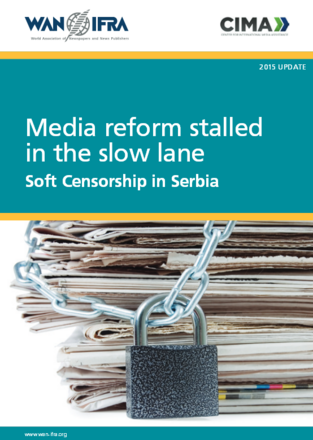
The report, prepared by Tanja Maksic in cooperation with the Balkan Investigative Reporting Network (BIRN) Serbia team, updates the January 2014 report, “Soft Censorship: Strangling Serbia’s Media” that described how Serbian officials were systematically obstructing urgently needed media sector reforms. In this report, soft censorship is defined as “the array of official actions intended to influence media output, short of legal or extra-legal bans, direct censorship of specific content, or physical attacks on media outlets or media practitioners”.
The report's main findings point to the lack of transparency affecting state funding to media and state advertising budgets. These two mechanisms are hence used to subsidize survival of state-owned media or media favourable to the government.
In relation to the 2014 report, small improvements to the legal framework are noted, but these are not fully implemented due to political inference. Still, a considerable portion of the media in the country rely on state funding to secure their survival, while the state-owned companies remain one of the most lucrative sources of financing especially for local media. Over all, only 20% of the the state media sector spending is allocated on a competitive bases. Finally, the report gives practical raccomandations on how the state can contribute to assure to media liberty and indipendence in Serbia.
Tags: Censorship Media Law Serbia Media funding Media ownershipThe content of this article can be used according to the terms of Creative Commons: Attribution-NonCommercial 4.0 International (CC BY-NC 4.0) . To do so use the the wording "this article was originally published on the Resource Centre on Media Freedom in Europe" including a direct active link to the original article page.

